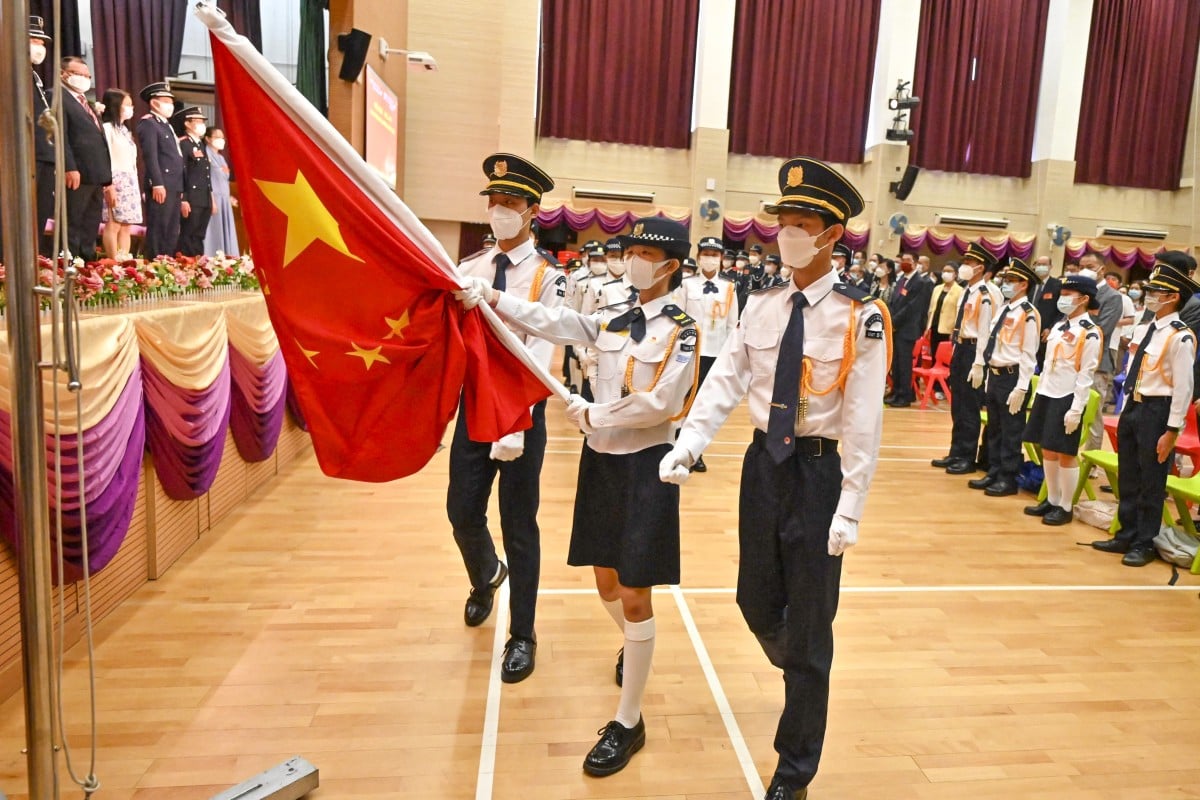
- Inspection hit out at teachers for failing to promote a sense of belonging to the country and called on management to take a stronger lead
- Legislator Tang Fei hopes the bureau will issue more support material for teachers, especially for junior classes, which do not have a similar subject
 Students take part in a flag-raising ceremony to celebrate the 25th anniversary of Hong Kongs handover from Britain to China at a school in the Tung Chung district of Hong Kong. Photo: AFP
Students take part in a flag-raising ceremony to celebrate the 25th anniversary of Hong Kongs handover from Britain to China at a school in the Tung Chung district of Hong Kong. Photo: AFPAn annual official review of Hong Kong’s schools has labelled efforts to teach national education “unsatisfactory” and hit out at teachers for failure to promote a sense of belonging to the country or duty to safeguard its well-being.
The inspection by the Education Bureau looked at 169 schools out of the more than 1,160 in the city in the 2021-22 academic year. It was the first since national security education was added to the curriculum in response to growing anti-Beijing sentiment and a strengthening localist movement.
“There are still many schools that have not been able to fully cover the education of the constitution and Basic Law among the key learning elements,” the report said.
“It is not favourable to the adoption of a holistic approach to understanding our country’s history and culture, or to gaining a correct understanding of the ‘one country, two systems’ policy and the constitutional order.
“This practice is unsatisfactory.”
Hot Topics: Hong Kong’s new subject to foster patriotism in junior forms
The Basic Law is the city’s mini-constitution, and the one country, two systems governing principle defines the relationship between Hong Kong and the central government.
The bureau said in its 14-page report, released in Chinese earlier this month, that “only some” schools had set objectives for the development of national education, and called on management to take a stronger lead in planning and implementing the topic.
But the inspectors also acknowledged that national security education was in its infancy as it was only introduced in the 2021-22 school year.
Only a “minority” of teachers incorporated national security education into their subjects, the bureau said, and “many others focused too much on knowledge-feeding”. It said schools should create an atmosphere in the classroom and outside to instil “love for the country and love for Hong Kong” among pupils.
The bureau’s report also looked at Chinese-language teaching for pupils from ethnic minority backgrounds. It found that many schools had failed to provide sufficient support for the subject.
The bureau also called on schools not to overload pupils with homework and said they should encourage youngsters to take part in more sports activities to assist in rounded development.
Legislator Tang Fei, also a vice-chairman of the Federation of Education Workers, said he hoped the bureau would issue more support material for teachers, especially those in junior classes.
“National security education is rather new to schools, and it takes time for schools, and teachers as well, to adapt and learn how to teach the topic,” Tang, a former principal of Tseung Kwan O Heung To Secondary School, said.
“For the senior secondary classes, there is the Citizenship and Social Development curriculum that also covers national education and national security education. So, it is easier for teachers to get teaching material for reference.
“But for junior secondary or primary classes, there is not a similar subject. Often teachers will have to prepare teaching and learning material on their own,” Tang said.
He added that the coronavirus pandemic had affected the “values education curriculum framework” issued last year, which touched on national education and encouraged exchange visits with children from mainland Chinese schools.
“Mainly because of the Covid-19 pandemic, it is academic to talk about organising visits to the mainland or having exchanges with schools there,” Tang said.
Hong Kong schools to inform officials about progress of national education
The report came after a revised code of conduct for the teaching profession was unveiled earlier this month.
The revisions demanded that teachers promote national education and report potential illegal activities or “morally deviant information”, with sanctions including deregistration available.
Secretary for Education Christine Choi Yuk-lin said at the time the revised code laid down clearer guidelines for teachers.
The former administration pledged to revise the code after lawmakers accused some teachers of taking part, or inciting pupils to take part, in the 2019 social unrest.